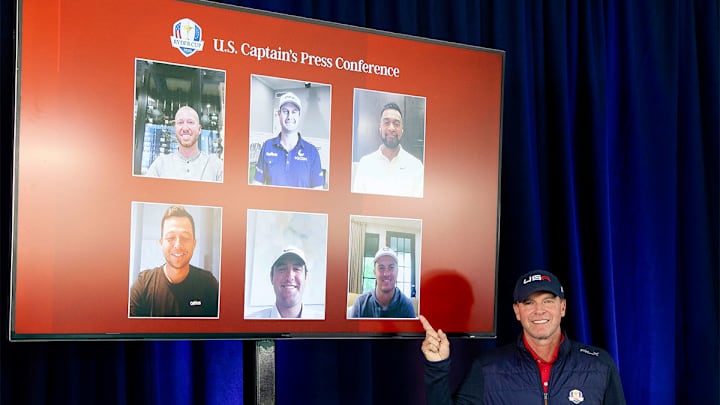Steve Stricker Picks a Younger, Brawnier American Ryder Cup Team

Like any Midwestern fella with a job to do, U.S. Ryder Cup skipper Steve Stricker announced his six at-large selections Wednesday morning with the urgency of a man wishing the matches were to begin that afternoon. After setting an unofficial record for the quickest opening remarks by a captain in the history of the series, Stricker revealed the picks in equally straightforward fashion, none of which even remotely resembled a curveball.
Four of the six — Daniel Berger, Harris English, Scottie Scheffler and Xander Schauffele— will be making their Ryder Cup debuts. Tony Finau (2-1) and Jordan Spieth (7-5-2) were relatively easy choices because they’re among the few active Americans with a winning record vs. Europe, which makes Patrick Reed’s omission from the roster something of a notable absence.
Team. Complete.
— Ryder Cup USA (@RyderCupUSA) September 8, 2021
With his Captain's Picks locked, @SteveStricker selects:
🇺🇸 @DanielBerger59
🇺🇸 @Harris_English
🇺🇸 @tonyfinaugolf
🇺🇸 @XSchauffele
🇺🇸 Scottie Scheffler
🇺🇸 @JordanSpieth pic.twitter.com/wFGR3bw8IH
More on that later. Stricker obviously did his homework in preparation for such a crucial task, this being the only time in the modern era that a captain has filled out half a Ryder Cup roster arbitrarily, and the data he compiled on first-time participants offers irrefutable evidence that experience, ahem, is overrated.
Been there, done that? Conventional wisdom isn’t always where it’s at. America’s Ryder Cup rookies are a cumulative 40-29-17 since 2008, an alarming success rate given that Old Glory, pardon the oxymoron, has beaten the Euros just once over those 13 years. Stricker’s team is extremely young: an average age of 29, just one player (Dustin Johnson) older than 32. It includes six rookies overall, making this the start of a new generation in the biennial battle, at least on this side of the Atlantic.
Or so Uncle Sam hopes. “It’s a good time for an influx of younger players,” Schauffele said without a trace of whippersnapper’s arrogance.
The repeated failures of U.S. squads headlined by three decorated veterans (Tiger Woods, Phil Mickelson, Jim Furyk) and what should have been a very able supporting cast, Stricker included, will have little or no bearing on what happens later this month at Whistling Straits. The 2021 Yanks, however, have virtually no competitive scar tissue, and on home soil, are a pronounced favorite against an opponent undergoing its own transitional phase.
Six rookies is a bunch, but there are also six major champions on the American side. Four of them are multiple-major winners. Thirteen big titles have been claimed by Stricker’s troops overall, all since Spieth went back-to-back at the Masters and U.S. Open in 2015. Europe’s qualification/selection process won’t be completed until this time next week, but again, on paper, Padraig Harrington’s group can’t come close to matching the depth or accomplishment of the host team.
In a phone conversation two weeks ago, Stricker made a point of extolling the value of premium length at a gigantic ballpark such as Whistling Straits. His picks reflect that priority — Schauffele, Finau and Scheffler ranked among the top 40 in driving distance during the 2020-21 season. English certainly isn’t a short hitter, nor is Spieth, who almost averaged 300 yards per pop while retrieving his career from the scrap heap.
Several players in serious consideration for a roster spot, meanwhile, were left behind by the U.S. skipper. Reed (11th) and Webb Simpson (13th), the two highest-ranked guys in the Ryder Cup standings that didn’t make the team, finished 149th and 141st in distance off the tee. Kevin Na, whose excellent finish over the final six weeks of the season culminated with a tie for first at the Tour Championship, ranked 177th.
“Even though he played well down the stretch, he was 19th in the standings,” said Stricker, who delicately mentioned Na’s lack of power as a reason he wasn’t picked.
Reed had been a Ryder Cup stalwart before playing poorly three years ago in France. Being hospitalized with pneumonia obviously hurt his bid to make the roster, but Stricker’s insistence on team unity and Reed’s disruptive manner made him a longshot, especially after Finau won the first FedEx Cup playoff event.
“I kind of lost sleep over that one,” Stricker admitted. Reed was the first player he called to break the bad news, and that conversation apparently went well, which matters not. With Brooks Koepka’s availability for the Ryder Cup uncertain due to a forearm injury he suffered at the Tour Championship, Reed would be a likely candidate to fill the spot, but as Stricker also pointed out, “we’ve talked about that, but we’re not there yet.”
With nine of the top 11 players in the Official World Golf Ranking at his disposal, Stricker has assembled as powerful a unit as any American squad since 1999. There is no Brett Wetterich to be found on this roster. Scheffler is the most unproven member, still winless in 84 career starts, but he has been a mainstay in the OWGR top 25 since finishing second to Billy Horschel at the WGC-Match Play in March.
Stricker is a gentle soul, a play-it-straight Wisconsinite who served up zero surprises with his six picks. There are many buttons to be pressed between now and the Sunday singles matches, but the simple fact that all 12 players are expected to gather at Whistling Straits this weekend — something that never happened during the Woods-Mickelson era — is a positive sign in terms of cohesion and enthusiasm.
Neither of those qualities will win you a Ryder Cup, but they sure as hell won’t lose you one, either.
